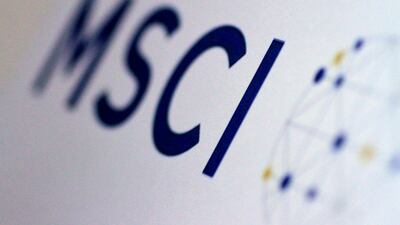The index compiler MSCI said late on Tuesday that it has added Saudi Arabia to its watchlist for possible addition to its emerging market measure of stocks after the Kingdom fulfilled a number of pending requirements including bringing settlement in line with leading international stock exchanges.
The decision by MSCI - which has been widely expected - doesn't however mean that Saudi Arabian stocks will immediately join the MSCI Emerging Market stock index, a gauge that tracks more than 800 stocks in 23 developing nations, and its likely to take up to two more years before Riyadh-listed equities officially join the index as is typically the process with any upgrade.
Regional investors told The National that they expect that investors who track indexes, typically known as passive investors because they don't pick stocks, will buy between US$10 billion to $12bn of Saudi equities as a result of the upgrade while investors that pick stocks, called active investors, will invest a further $30bn to $35bn.
The upgrade is expected to be announced in mid-2018 while implementation will follow in mid-2019. Equities in the Kingdom are expected to rally ahead of the formal inclusion if history is anything to go by. The move is also expected to give a boost to stocks region wide.
"Typically what happens is the market has the maximum rally between the date of announcement and the date of inclusion," said Sachin Mohindra, a portfolio manager at Invest AD, an Abu Dhabi-based asset manager.
"We saw that in Qatar, we saw that in UAE and other markets in Argentina. So between now and then we could see a lot of interest building up for the region as a whole because the region then comes on the radar as a whole for managers all over the world."
The Tadawul, as the Saudi stock exchange is known, is the Arabian Gulf’s largest equity market with a market capitalisation exceeding 1.6 trillion Saudi riyals. Foreigners owned about 4.3 per cent of the market by the end of June 15, according to the exchange. Saudi Arabia, which allowed foreigners direct access to stocks in June 2015, last year further eased rules for them in a bid to attract more capital flows.
The Capital Market Authority, the Tadawul’s regulator, has also taken steps to increase its chances of inclusion in MSCI Emerging Market index as well as FTSE's EM index.
This year, the regulator changed the settlement cycle for listed shares to within two working days, also known as T+two, from T+0, a reform that is expected to help it join MSCI emerging market index.
Saudi Arabia’s weighting in the MSCI index is expected to range between 2.5 and 3 per cent, a level that would be the highest for a Mena country. Brazil, for example, has a 6.85 per cent weighting in the index, according to MSCI data from May.
Ahead of last night's announcement, over the past week, Saudi Arabian shares have rallied. The Saudi index jumped 2.4 per cent on Monday after Mohammed El-Kuwaiz, vice chairman of the Capital Market Authority, was quoted as saying by the Asharq al-Awsat newspaper that he expected Riyadh to be upgraded to emerging market status by the end of 2018. That would be a departure from the norm when it comes to MSCI index reclassifications.
"Could they accelerate it? It's possible," said Mohamed El Jamal, managing director of Waha Capital Markets, the asset management division of Waha Capital, the Abu Dhabi-based investment firm. "But it would take a lot of effort and would be an exception to the text book.
Mr El Jamal, who oversees the investment of $300 million in Middle East and North Africa equity markets, said despite speculation about timing of when Saudi will be included, investors, including himself, had already been buying up shares in anticipation of the move - motivated not just by the possible MSCI upgrade but also by Saudi Arabia's efforts to make itself less reliant on oil revenues.
Saudi Arabia, which is on a reform drive, plans to sell shares in state oil company Saudi Aramco and the Saudi stock exchange operator itself as it seeks to woo more non-oil investments.
A number of risks remain on the horizon however, according to investors, including persistent lower oil prices and increased geopolitical tensions.

